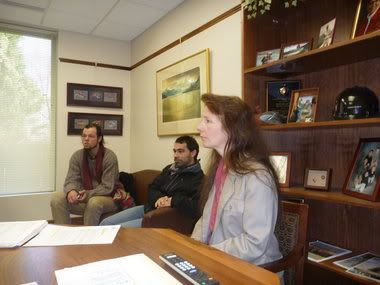
Recent raids on the Occupy movement’s major camps have led some mainstream media outlets to declare that all the camps are “gone,” a claim easily disproven by visiting any one of the dozens of cells still operating in smaller towns and cities all across the country.
Not only are many camps still in operation, but the offshoots of Occupy are not only surviving, but securing real, meaningful victories, which should interest media players who bemoaned that Occupy was too ideologically scattered and too flighty to fight for lasting policy changes.
Occupy oftentimes plays a supportive, inspirational role in ongoing protests. For example, parents and students occupied Brian Piccolo Specialty School on Chicago’s West Side for nearly twenty-four hours in opposition to a proposal that would result in the firings of Piccolo’s entire staff under the tutelage of a private operator, a dramatic gutting process the city refers to as a “turn-around.”
Outside, Occupy Chicago and other allies set up an encampment and protested in solidarity.
At the end of the twenty-four hours, parents and students declared a victory when the Board of Education promised to have a meeting with them. Parents insist the board erroneously decided to close the school based on incomplete information.
“You cannot go around and affect the lives of thousands of children based on a lack of information,” said Cecile Carroll, a community member and parent of two Chicago Public Schools students, during a press conference announcing the end of the occupation. “If you would have engaged with us in the first place, we would never have had to do this.”
“It’s not over yet,” Keilah Becker, a member of the Occupy Chicago Social Media Committee and one of the twelve people who spent last night inside Piccolo told the Occupied Chicago Tribune. “The fight is long-term. There are so many other schools on this turnaround list.”
Occupy other times plays a more direct role in protests, such as the Occupy Our Homes movement that recently helped a 78-year-old former civil rights activist in Atlanta stay in her home after she was threatened with foreclosure by JP Morgan Chase (while the bank was touting its commitment to the values of Dr. Martin Luther King Jr.)
OOH also helped four other individuals and families stay in their homes, most recently a man named Fred Shrum.
The “Occupy our Homes” movement has taken up the cause of Fred Shrum, another homeowner facing foreclosure in Metro Detroit.
The group is a coalition of anti-foreclosure groups, organized labor, and other activists with the Detroit “Occupy” movement.
So far, their protests on behalf of people facing foreclosure have helped keep four Metro Detroit families in their homes — including one case where protesters blocked a dumpster that came to clear out the house.
Those families were able to re-negotiate terms with their lenders.
Now, the group wants to help Shrum. The Dearborn Heights homeowner sought a mortgage modification when he had to take a pay cut and undergo surgery. But after what he calls a long and confusing back-and-forth with mortgage servicer Wells Fargo, Shrum didn’t get the modification – and now faces eviction.
Occupy activists in Oregon were generally overlooked by the national media. After all, with only six members in one of their working groups, they lacked the dramatic numbers at the Wall Street and Oakland camps. Yet, despite their small size, the group was able to secure a major victory by killing the Twitter-as-Felony bill SB 1534.
SB 1534 would have criminalized electronic communication, changing any misdemeanor into a Class C felony if it was arranged using the internet (“aggravated solicitation,”) and violations would have carried a $125,000 fine and up to five years in prison.
Obviously, Occupy participants who frequently use the internet and Twitter to put out calls to action could be speciously accused of “aggravated solicitation” for numerous reasons, so Occupy Oregon immediately went into action when they learned about the proposal:
We posted a Stop Senate Bill 1534 iPetition which gathered around 200 signatures over the weekend. Fliers were distributed around town. Very late on Friday, SB 1534 appeared on the list of scheduled hearings for Monday. One of us caught it.
Two Occupiers from Salem joined the group, and the newly formed coalition made up eight of the ten citizens who testified against SB 1534. After the hearing, the group visited a Republican Senator who had been a cosponsor of the bill.
He sat down with us for a long rather uncomfortable dialogue about the bill since he was not on the Judicial Committee which heard the testimony. We asked him to withdraw his sponsorship, and he did distance himself from the bill. We also told him that we were watching the legislature very closely this year which is how we found this particular bill, and we would follow up if the bill moved forward.
Occupy Oregon in the office of the Senator who cosponsored SB 1534. Photo by O’Stephanie

One particularly dedicated Occupier, identified as “O’Stephanie” at her Newsvine column, stayed overnight at the Statehouse. While there, she visited the office of the Eugene Democrat, Senator Floyd Prozanski, who told O’Stephanie in his capacity as Judicial Committee Chair that the SP 1534 was officially dead.
Not that I was gloating. Well, maybe a little. I was proud of all of us and how we the people had made our voices heard. In Western Oregon, local Occupys had organized into a loose coalition of “Occupy Oregon” so we could Occupy the Legislature for this month-long session.
And it all worked.




